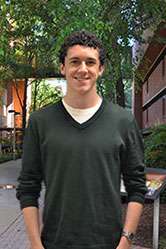Major: Biochemistry
“Estimating the Timing of a Major Geological Event Using Sequence Divergence of Freshwater Fishes”

The Hangay Plateau is a mountain range in Western Mongolia. The timing of the plateau’s uplift is currently being investigated with an interdisciplinary approach, using geological and biological data to estimate the timing. As the Hangay Plateau rose, it separated its rivers and the fish populations in them. As a result, we may be able to use the genetic relationships of the fish species across the Hangay range to determine the time of their most recent common ancestor, who would have lived before the plateau had risen. We collected samples of Barbatula, a genus of freshwater fish, from both sides of the plateau, and we will sequence the cytochrome b gene and compare the sequences using the BEAST program. The BEAST program compares gene sequences to estimate how long ago, in real time, populations on either side of the plateau diverged from each other. Using these techniques, we will be able to estimate the uplift of the Hangay Plateau based on biological data. Ultimately, these biological data will be compared with geological data to determine if the two sources are comparable.
How did you find your mentor for your research?
I had Dr. Mendelson for Biology 142, and she discussed her research briefly during class. I was interested, so I went up after class and asked her more about it and whether she had any room in her lab for an undergraduate.
Is this your first independent research?
I had a research project in high school that examined the bioaccumulation of a pesticide through an aquatic food chain. However, it didn’t go very well because at the time I didn’t realize how much effort you had to put into research to make sure it went properly. Since then, I have had other research experiences where I learned how to really do research.
How much time do you put into it?
I usually aim for 8-10 hours each week during the school year, but it depends on what else I have going on. This summer I’m doing research for roughly 30 hours each week, it’s nice to not have much else to distract me. I can devote a larger portion of my time to it, and make much more progress.
How did you hear about theUndergraduate Research Award (URA) program?
Dr. Mendelson suggested that I apply, but I had known students who received a URA before.
What academic background did you have before you applied for the URA?
When I applied for my URA I was halfway through my Junior year. I had taken all of the introductory science courses and was starting to move into more major specific courses, like comprehensive biochemistry.
Was the application difficult to do?
The application was not difficult, but it’s definitely not something you should attempt to do at the last minute. I spent a lot of time making sure that my abstract and other application materials accurately described my project and what Dr. Mendelson and I planned to do.
What has been the hardest part about your research?
My research involves using computer programs, like BEAST (Bayesian Evolutionary Analysis by Sampling Trees), to compare sequences of DNA and determine evolutionary relationships. I’ve never used a program like BEAST, so it took me a while to figure out what the program was doing, and how to optimize the settings.
What else are you involved in on campus?
In addition to research, I also tutor in the Chemistry Tutorial Center, and TA for Cell Biology. Outside of science, I’m a Senator in the Student Government Association, and I work with the Admissions Office as part of the A-Team. I enjoy being in SGA because it gives me a break from science, and I get to work with other students who I wouldn’t have met otherwise.
What is your advice to other students about getting involved in research?
Just do it. Make sure you know what you’re getting into, ask the PI if you can work in their lab for a bit, just to get a sense of the kind of work you’d be doing. Most importantly, be ready for some experiments to fail. It happens to everyone, don’t get discouraged.
What are your career goals?
I’m currently in the process of applying to MD/PhD programs. Ideally, I will eventually be a physician-scientist, treating patients and doing research together. It is a important role that helps transition ideas generated by research into medically relevant applications.
9/26/2018